
Treatment of oncology in children
What are the evidence-based treatments?
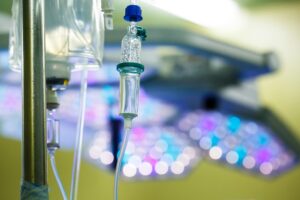
Evidence-based therapies are approaches whose effectiveness has been confirmed by scientific research and clinical trials. They are the basis of modern oncology and are used in accordance with international clinical protocols.
Main methods:
-
- Chemotherapy - is the most common type of treatment. It involves the use of special drugs that destroy cancer cells or stop their growth.
- Surgical intervention - is used to remove a tumor if it can be localized and safely removed.
- Radiation therapy - destroys cancer cells with the help of high-precision ionizing radiation.
- Immunotherapy - activates the child's immune system to recognize and destroy cancer cells.
- Innovative methodswhich are increasingly being used:
- Targeted therapy - drugs that act on specific genetic mutations in the tumor;
- Proton therapy - a highly accurate type of radiation therapy with minimal impact on healthy tissues;
- Gene therapy - a promising area that is being studied in clinical trials and can only be used by a medical team in accordance with clinical guidelines.
Important: Availability of certain methods may vary by country, medical facility, and healthcare system.
Duration and stages of treatment

The duration of treatment in children depends on the type and stage of the disease, as well as on the individual response to therapy. On average, treatment can last from several months to several years.
The main stages of treatment:
- Diagnostics
Duration: from a few weeks to a month.
Includes: blood tests, biopsy, imaging (CT, MRI, PET-CT), lumbar puncture, etc.
Objective. - establish the exact diagnosis and stage of the disease.
- Intensive care
Duration: 3-6 months (depending on the protocol).
Includes: chemotherapy, surgery, radiation therapy.
Objective. - destroy tumor cells and achieve remission.
- Maintenance therapy
Duration: up to 2-3 years (depending on the type of cancer). For example, in case of acute lymphoblastic leukemia (ALL), a child takes medications at home in the form of tablets and undergoes regular examinations.
Objective. prevent the disease from returning.
- Observation (follow-up after remission)
Duration: for several years. Regular visits to the doctor, tests and examinations.
Objective. - detect possible complications or relapse in a timely manner.
Example:
- For children with GLL the full course of treatment usually lasts 2-3 years.
- At solid tumors (e.g., sarcomas, brain tumors) - usually up to 1 yearbut with long-term follow-up.
Why is it important to follow the treatment plan?
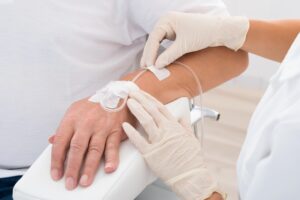
Adherence to the treatment plan is critical to the effectiveness of cancer therapy.
Any interruptions or changes in therapy without your doctor's approval can reduce the effectiveness of treatment and increase the risk of relapse (return of the disease). For example, missing a course of chemotherapy can give cancer cells a chance to become active again.
Regular visits to the doctor and follow-up tests allow us to detect complications in time, change the dosage of medications or adjust the treatment plan.
Even if the child's condition has improved significantly, you should not stop therapy on your own. Completing the full course of treatment is a way to minimize the risk of the disease returning in the future.
How not to miss a single stage of treatment: simple tools for daily planning?
When a child is undergoing treatment, attention to detail is of great importance. The regularity of procedures, timely medication, and a clear schedule of visits all contribute to the success of therapy. Here's how to organize the process so that you don't forget anything.
- Keep a calendar
WhyTo see the entire treatment path and avoid overlaps.
How to do it:
- Choose a convenient formatwall calendar, diary, Google Calendar, or an app on your phone.
- Enter all important events: visits to the doctor, chemotherapy, tests, consultations, medications.
- Use colors:
- red - urgent (sessions),
- green - control (analyzes),
- blue - consultations.
Tip.: Post the calendar in a visible place or share it with other family members.
- Turn on reminders
Whyto avoid losing sight of the important things in the midst of everyday life.
How to do it:
- Phone.Set reminders for a day and an hour before the event.
- Smartwatches or voice assistants (Siri, Alexa): can remind you by voice.
- StickersFor those who do not use technology, stickers on the refrigerator, doors, and mirrors.
Tip.: Arrange for someone close to you to duplicate the reminders - this is an added security feature.
- Plan your trips in advance
Why: to avoid being late and reduce stress.
How to do it:
- Specify the address clinics, appointment times, contact numbers.
- Create a route: if necessary, check the bus/train schedule or plan a trip by car.
- Prepare an "anxiety bag":
- documents (passport, medical certificates);
- a bottle of water, a light snack;
- medicine, exercise, a favorite toy or book for the child.
Tip.: Enlist family or friends to help with transportation or escorts.
Other good habits:
- Distribute responsibilities. One family member is responsible for the calendar, the other for the medicine or the road.
- Keep in touch with your doctor. If something happens, let us know immediately to avoid disrupting the schedule.
- Keep track of your medications. Check weekly to see if everything is in stock.
- Take care of yourself. If you feel tired, seek support from a psychologist or support group.
Being organized is your ally in the fight against the disease. Even small steps, such as a calendar or alarm clock, can make daily care much easier and support the most important thing - hope for recovery.
The body's response to anticancer therapy
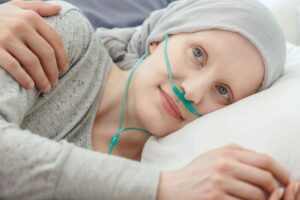
The body's reaction to treatment is individual and depends on the type of therapy, dosage, general condition of the child and his or her characteristics. However, there are typical side effects that can occur during treatment:
- Chemotherapy: nausea, vomiting, hair loss, fatigue, decreased appetite, changes in blood tests (anemia, decreased immunity).
- Radiation therapy: redness or irritation of the skin in the exposure area, fatigue, swelling, dysfunction of organs near the exposure area.
- Immunotherapy: fever, chills, allergic reactions, rashes.
- Surgical intervention: pain at the surgical site, risk of infection, temporary dysfunction of the operated organ.
These side effects occur because the therapy affects not only cancer cells but also healthy cells. They are mostly temporary and disappear after treatment is completed. Doctors always select adjuvant (supportive) therapy to reduce unpleasant symptoms and improve the child's quality of life during treatment.
What complications can occur during and after cancer treatment in children?
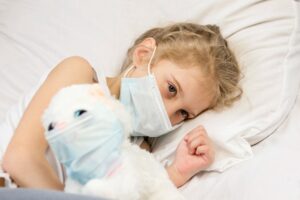
Complications during and after treatment of cancer in children are possible, but Not all children face them. Their appearance depends on several factors:
- Type of cancer: for example, leukemias are more likely to cause blood problems (anemia, infections), and brain tumors are more likely to cause neurological changes.
- Amount of therapy: high doses of chemotherapy or radiation therapy increase the risk of side effects, while less intense treatment may be easier to tolerate.
- Body characteristics: age, general health, and genetics affect how a child tolerates therapy. Some children recover quickly, while others need more time and support.
During treatment possible complications associated with aggressive therapy and reduced immunity:
- Infections - due to a decrease in the number of white blood cells, the body is less protected from bacteria and viruses.
- Bleeding - can occur due to a drop in platelet count.
- Toxic damage to organs - chemicals can affect the heart, liver, and kidneys.
After completion of treatment There may also be long-term consequences:
- Hormonal disorders - For example, problems with the thyroid gland or sexual development.
- Stunted growth and physical development - due to the effects of chemotherapy or radiation therapy.
- Problems with memory, learning, concentration - especially after brain irradiation.
- Risk of secondary cancer - in 1-5% cases due to the effect of therapy on cell DNA.
It is important to remember: complications are not a guarantee, but a possibility. Many children pass this stage without serious problems thanks to modern methods and supportive therapy.
After the therapy is completed, the child is monitored by a team of specialists to identify and correct possible complications. Here is who may be involved:
- Oncologist: the primary care physician who monitors remission and the risk of relapse.
- Endocrinologist: checks the hormonal background (height, sexual development, thyroid gland), especially after radiation therapy or chemotherapy that affects the glands.
- Cardiologist: monitors heart function, as some drugs (e.g., anthracyclines) can weaken it.
- Neurologist: evaluates the nervous system if the cancer or radiation affected the brain (problems with coordination, memory).
- Psychologist or psychotherapist: helps the child and family adapt to life after the disease, cope with anxiety or fear of relapse.
- Ophthalmologist: checks vision if the tumor or radiation was close to the eyes.
- Rehabilitation specialist: helps to restore mobility after surgery or weakness.
- Hematologist: monitors the blood condition in case of leukemia or hematopoiesis disorders.
This list may vary depending on the type of cancer and therapy. The oncologist coordinates the team and determines who else should be involved.
After discharge, it is important to monitor the child's condition in order to notice changes or complications in time. Here's what to look for:
- Changes in behavior: irritability, apathy, or withdrawal may signal emotional difficulties or neurological problems.
- Fatigue: persistent weakness that does not go away after rest may indicate anemia or hormonal disorders.
- Pain: new or unexplained pain (head, bones, abdomen) needs to be checked, as it may be a sign of a relapse or side effect.
- Temperature: a fever above 38° is a reason to urgently consult a doctor, because the immune system may still be weakened.
- Weight changes: sudden weight loss or weight gain for no reason is a signal for an endocrinologist.
- Breathing or heart problems: shortness of breath, heart palpitations - see a cardiologist.
- Skin and hair: Rashes, dryness, or slow hair regrowth may indicate deficiencies or hormonal changes.
How to act:
- Keep a diary of observations (date, symptom, duration).
- Don't panic, but react quickly: call your oncologist if you suspect anything.
- Follow the schedule of examinations (tests, ultrasound, MRI), even if everything seems fine.
Follow-up after treatment is a partnership between parents and doctors. Your attentiveness and regular contact with specialists will help your child return to a full life.
Maintenance therapy during treatment
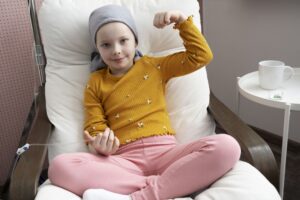
Supportive therapy is often an important part of treatment, but it is prescribed by a doctor individually - only if necessary and depending on the child's condition.
Here are the main types of drugs that can be used:
- Drugs for hematopoiesis. For example, medications that stimulate the formation of white blood cells to reduce the risk of infections.
- Antiemetics. It helps with nausea and vomiting after chemotherapy.
- Means to support the liver. For example, phospholipid-based hepatoprotectors reduce the burden on the liver during treatment.
- Antimicrobials. Antibiotics, antiviral, antifungal - used if there is a high risk of infection or there are already signs of infection.
- Vitamins and minerals. They are prescribed only when indicated. Some supplements may interact with chemotherapy, so they should be taken only after consulting a doctor.
During the treatment of cancer, many parents want to support their child with additional means - vitamins, immunostimulants, "natural" dietary supplements. But it is important to know that self-medication during this period can be harmful.
Why is it dangerous?
- Interaction with chemotherapy:
Some vitamins (e.g., C or E in high doses) can reduce the effectiveness of medications by neutralizing the effects of chemicals.
- Overloading the body:
The liver and kidneys are working to the limit, eliminating toxins after treatment. Additional drugs - even "light" ones - can complicate their work and cause toxic damage.
- Risk of complications:
Attempts to "boost the immune system" can cause undesirable reactions or even stimulate tumor growth.
- Diagnostic failure:
Even iron or calcium can alter blood tests, making it difficult for a doctor to properly assess a child's condition.
What to do instead?
Trust your doctor:
If you have any doubts - for example, if your child is weak or does not eat well - discuss it with an oncologist. Only he or she can prescribe the necessary medications, for example:
- Vitamin D - in case of laboratory-confirmed deficiency
- Folic acid - for anemia
- Enteral nutrition - if there are problems with appetite
Avoid self-medication:
- No drugs - even "natural" ones - without a doctor's consent. What is suitable for one child may be dangerous for another.
- Nutrition is the best support. ЗInstead of additives, use nutritious foods if allowed (broths, purees, nuts, smoothies, etc.).
Support should be safe
Supportive therapy is not "just in case" but a well-defined part of treatment. Your care is not about additional pills, but about trust in the team of doctors and a careful approach to every step.
Do I need to wear a mask during therapy?
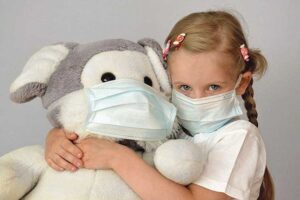
Wearing a mask is not always mandatory, but in some situations it is recommended to protect a child with reduced immunity.
For the child:
The mask is recommended if:
- the child is in crowded places: transportation, hospital queues, shops, schools;
- during outbreaks of viral diseases (e.g., influenza or COVID-19);
- someone in the house or in the ward has cold symptoms.
At home or in a hospital room, if there are no patients nearby, you do not need to wear a mask.
For parents and loved ones:
- You should wear a mask if you have symptoms of SARS (runny nose, cough, fever) or have been in contact with people who are sick.
- If you are healthy but in close contact with a child, a mask is an additional protection, especially during a period of weakened immunity.
The main goal is to reduce the risk of infections, as the child's body is less protected during treatment.
How often should I change the mask?
- Disposable mask:
Change every 2-3 hours or sooner if it becomes damp (from breathing, sneezing, or coughing).
A wet mask loses its protective properties and can become a source of germs.
- Fabric mask (reusable):
Wash daily in hot water (60°C) with soap and water or disinfectant.
Ironing after washing is an additional protection.
Change during the day if it gets dirty or causes discomfort.
Tip.: Keep a supply of 3-5 masks in your bag so you always have a fresh one on hand.
How to wear a mask correctly?
- Putting on:
- Wash or sanitize your hands.
- Cover your nose and mouth tightly. The mask should fit snugly with no gaps.
- Wearing:
- Do not touch the mask with your hands - especially from the outside.
- Do not move it under the nose or on the chin.
- Removal:
- Remove by the rubber bands without touching the front.
- Throw away the disposable immediately or place the cloth in a separate laundry bag.
- Be sure to wash your hands after removal.
Tip.: Choose a child's mask that fits properly, so it doesn't squeeze or slip.
When is a mask mandatory for a child with cancer?
It depends on your health condition and doctor's recommendations:
- During intensive care (especially in the first months), a mask is often necessary even at home when there are guests.
- When the neutrophil count is low, it is critical, and a mask is needed even in normal situations.
- During epidemics (influenza, COVID-19), the doctor may tighten the requirements.
- During maintenance therapy or after immune recovery, the requirements may be lighter.
Always consult an oncologist or hematologist. They will tell you when and where a mask is needed for your child, taking into account the tests and condition.
A mask is not a restriction, but a care. Explain to your child that it is a temporary protection that helps to recover faster and avoid complications.
Impact of chemotherapy and radiation therapy on child development
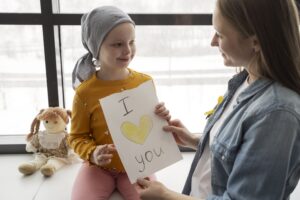
Chemotherapy and radiation therapy can affect a child's development, but the degree of this effect depends on several factors: the child's age, the type and dose of therapy, and the duration of treatment. It is important to understand that This impact does not mean that the child will not be able to live a full life - Most children adapt to life after therapy, although in some cases they may need support in certain areas.
- Physical development
Growth may be slowed or weight gain may be delayed. It is often associated with loss of appetite, fatigue, or side effects of medications. - Cognitive development
Some children have difficulty concentrating, remembering or learning - especially after radiation therapy to the brain. - Hormonal disorders
There may be malfunctions of the thyroid gland, delayed or impaired puberty. In the future, there may be a decrease in fertility (ability to conceive). - Functioning of internal organs
Some chemotherapy drugs can affect the heart, kidneys, and liver. That is why doctors regularly monitor organ function during and after treatment.
After treatment, the child is under the supervision of doctors who, if necessary, prescribe rehabilitation programs, correction of the educational process, hormonal support, etc.
What is important for parents to know?
- Not all children have problems. Many complete treatment without significant complications and return to normal life. The impact is individualized - for example, older children or those who received lower doses often recover faster.
- Support solves a lot. If difficulties arise, they can be adjusted. For example:
- Growth retardation or hormonal changes - an endocrinologist will prescribe therapy (hormones).
- Learning disabilities - tutors, special programs, or classes with a neuropsychologist can help.
- Physical limitations - a rehabilitation specialist will restore mobility.
- A full life is possible. Even with certain changes (for example, shorter height or the need for glasses), children can lead active lives, study, work, and start families. The impact on development is not a sentence, but a feature of a particular path of recovery.
What to do?
- Follow up your child after treatment with specialists (oncologist, endocrinologist, neurologist).
- Don't hesitate to ask for help: schools, psychologists, or rehabilitation centers can adapt the conditions for your child.
- Give time: the child's body has a great potential for recovery, especially at a younger age.
Can I keep pets and/or flowers during treatment?
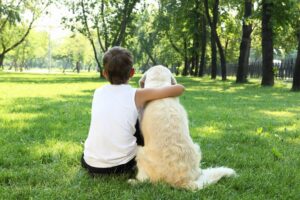
Yes, you can, but with certain security measures, because during treatment the child's immunity is weakened, and the risk of infections increases significantly.
Pets - It is possible, but with caution. Cats and dogs can stay in the house if they are healthy, vaccinated, and regularly examined by a veterinarian.
Avoid contact with:
- cat litter boxes, cages, and aquariums;
- raw meat or fish that the animal can eat;
- scratches and bites - even accidental ones.
Whom you shouldn't have:
Birds, rodents, reptiles - they are more likely to carry infections that are dangerous for children with weakened immune systems.
Fresh flowers are not desirable. The soil may contain fungal spores or bacteria that are dangerous for the child. Therefore, it is better not to keep fresh flowers in the room where the child lives. An alternative: artificial flowers or a bouquet without soil (for example, in water, but not next to the bed).
After completing chemotherapy or radiation therapy, parents often ask: "When can I have a pet again?" or "Can I have flowers at home?"
When are the restrictions lifted?
Immunity is not restored immediately; it is a long process that can take time:
- 6-12 months after completion of treatment
- Up to a year - in case of leukemia
- Faster - with less intensive therapy of solid tumors
An oncologist or hematologist monitors this process with the help of tests (neutrophils, lymphocytes). When the indicators are normalized, the restrictions are gradually lifted.
When can I have an animal again?
If you abandoned your pet during treatment, you can only get a new animal after confirmation of immune recovery.
Tips:
Start with less risky animals (dog, fish).
There must be an animal:
- examined by a veterinarian
- vaccinated
- treated against parasites
Watch your child: if symptoms of allergy or deterioration appear, postpone meeting the pet.
What about flowers?
You can have fresh flowers at home even immediately after discharge if you:
- the room has good ventilation
- no mold or mildew
Avoid flowers with a strong scent and do not place them close to the child's bed.
Over time, your family will be able to return to their favorite things again - without unnecessary risk. Just give your child's immune system time to recover, and make decisions together with your doctor.
Did the child get sick during therapy?
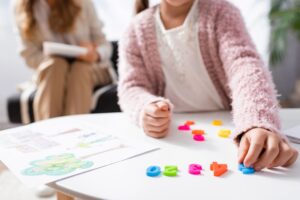
During cancer treatment, no medications should be given to your child without the approval of the oncologist. Some drugs can interact with chemotherapy or increase side effects.
What is usually allowed (only after consulting a doctor):
- Paracetamol - at high temperatures (be careful, as it affects the liver).
- Ibuprofen - only if there are no problems with blood clotting.
- Antibiotics - are prescribed by a doctor for bacterial infections.
- Antifungal and antiviral agents - only for its intended purpose.
- Remedies for nausea, diarrhea, constipation - under the supervision of a doctor.
What is prohibited or undesirable:
- Immunomodulators, "immune boosters" (e.g., echinacea, interferons) - can affect the course of treatment or cause complications.
- Aspirin - increases the risk of bleeding.
- Some antibiotics (aminoglycosides, tetracyclines) - toxic to the kidneys, liver, or bone marrow.
- Dietary supplements, herbal medicine, vitamin complexes - can change the effect of chemotherapy drugs.
If there is any deterioration or symptoms (fever, cough, rash, pain, etc.), contact your child's doctor immediately. Self-medication can be dangerous.
Can I get vaccinated during or after therapy?
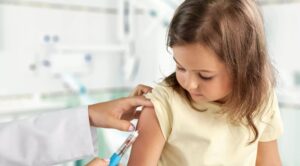
Vaccinations are not allowed during treatment.
During chemotherapy or radiation therapy vaccination is not carried out because:
- immunity is severely weakened;
- the body will not be able to respond adequately to the vaccine;
- This can be dangerous for the child, especially in the case of live vaccines.
After treatment - It is possible, but with caution.
Vaccinations are being restored not earlier than 6-12 months after completion of treatment, only with a doctor's prescription and after assessing the state of the immune system (most often based on the results of a blood test).
Live vaccines will come even later. Vaccines that contain a weakened virus (e.g. measles, mumps, rubella, BCG, oral polio vaccine) can be dangerous for children with weakened immune systems. They are postponed for a longer period of time and used only after a thorough assessment of the child's condition.
Nutrition, care and physical activity during treatment
Nutrition:

A balanced diet is important for maintaining immunity. Recommended:
- Foods with high calorie content (meat, nuts, cereals), because chemistry causes weight loss.
- Easily digestible foods (mashed potatoes, soups) to avoid stress on the stomach.
- Plenty of fluids (water, compotes) to eliminate toxins.
The diet should be balanced, rich in proteins, vitamins, and minerals. Raw foods should be avoided.
It should be avoided:
- Fried food.
- Spicy dishes.
- Canned food.
These products can increase inflammation, irritation, or worsen the condition during treatment.
Enteral nutrition:
If the child is unable to eat due to nausea, stomatitis or other problems (for example, due to the effects of chemotherapy), the doctor may prescribe enteral nutrition:
- Nutrient mixtures are administered through a tube or vein.
- This allows you to provide your body with the necessary calories, vitamins and minerals when you have no appetite.
- The diet and type of food should always be agreed with a doctor depending on the child's condition.
Physical activity:
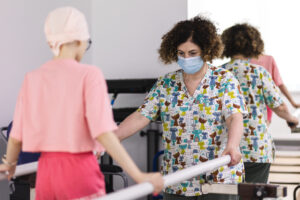
There is usually no need to limit mobility unless there are medical contraindications (e.g., fractures or severe weakness). Light activity, such as walking or playing games, can have a positive effect on mood and blood circulation.
However, it is important to avoid overexertion and monitor the child's general condition.
When and in what cases should physical therapy be started?
Physical therapy is necessary if there are mobility limitations or muscle weakness afterwards:
- operations,
- radiation therapy,
- the specifics of the disease.
When to start physical therapy?
It is usually started after the completion of the intensive phase of treatment, when the patient's condition is stable, and between courses of therapy.
Physical therapy should be individualized and adapted to the child's conditionso as not to overload the body. That's why it's important:
- Weakness after therapy. Chemotherapy and radiation deplete muscles and energy, so excessive exertion can cause fatigue or even injury.
- Features of cancer. For example, in osteosarcoma, the emphasis is on restoring walking, and in brain tumors, on coordination.
- The pace of recovery. Some children are ready to exercise earlier, while others need more time due to anemia or hormonal changes.
The physical therapist develops a program based on your needs:
- The age and physical capabilities of the child.
- Type of treatment (surgery, radiation).
- Current state (tests, health).
Examples: light stretches for weak muscles, balance exercises after neurological complications, or gradual loading with a prosthesis after amputation.
Advice to parents
Take your time and don't force your child to exercise on their own. Wait for the "green light" from the oncologist and entrust the process to professionals who know how to support, not overload, your child's body.
Who is involved?
- Oncologist: Allows you to start therapy when the body is ready.
- Physical therapist: Draws up an exercise plan and monitors progress. Conducts classes, adapting them to the child's reaction.
- Occupational therapist: helps to adapt to everyday challenges.
- Speech therapist: works with speech functions if they are affected by the disease.
- Psychologist: supports the child during rehabilitation and helps them overcome emotional challenges.
Benefits of physical therapy:
- Restoration of muscle mobility and strength.
- Improvement of the general physical condition.
- Prevention of complications, such as muscle atrophy or movement restrictions.
How to properly care for your skin during treatment?
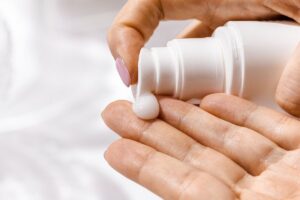
During treatment, the child's skin may become more sensitive and dry, so it is important to take proper care of it:
- Use hypoallergenic products that do not contain harsh chemicals.
- Avoid prolonged exposure to the sun, as the skin becomes more sensitive to UV rays.
Skin care:
- Use a mild, fragrance-free soap.
- Use alcohol-free creams to moisturize the skin.
- Protect your skin from the sun by wearing sunscreen with SPF 50+ to reduce the risk of sunburn.
In radiation therapy:
- The doctor may prescribe special ointments to care for the skin that is exposed to radiation.
Consult your doctor before using any products (soaps, creams, ointments). Why it is necessary:
- Reaction to chemotherapy. Some ingredients (e.g. essential oils or acids) can interact with chemotherapy drugs, causing allergies or increased irritation.
- The effect of radiation therapy. Products with metal particles (zinc, aluminum) or alcohol can worsen the condition of the skin in the irradiated area, causing burns or delaying healing.
- Individual features. The child may have a hypersensitivity that you are not aware of, and the doctor will choose a safe option.
What to do?
- Avoid self-treatment: even "natural" remedies (aloe, chamomile) can be dangerous without consultation.
- Ask your oncologist or dermatologist: "Which cream is suitable for my child's skin during this course?"
- Test new products carefully: apply a little to a small area of skin and wait 24 hours to check the reaction (but only after your doctor's approval).
Proper care will protect the skin from complications and ease the child's condition, but safety is paramount. Always check with your doctor what can be used in your case.
Support for immunity

- A balanced diet: It is important to provide your child with all the necessary vitamins and minerals. Include fresh fruits and vegetables rich in vitamins C and D, as well as foods containing proteins and healthy fats.
- Maintaining personal hygiene: Washing your hands regularly and keeping your room clean will help reduce the risk of infections. Remember to ventilate the room regularly.
- Drugs - only on medical prescription: Do not use any immunomodulatory or vitamin supplements without consulting your doctor, as some drugs may interfere with the effectiveness of the underlying treatment.
How do I get ready for the hospital if my child is hospitalized?
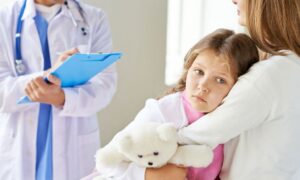
Documents:
- Passport of one of the parents.
- The child's medical record, including all previous tests and examinations.
- Laboratory test results (if available).
Things for the child:
- Change of clothes (suitable for hospital stay - comfortable and light).
- Personal hygiene products (soap, toothpaste, towel).
- A favorite toy or blanket for psychological comfort.
- Books or other entertainment materials for the time spent in the hospital.
- Charging for gadgets (phone, tablet).
- Tableware (cup, plates of various types, fork, spoon).
Things for parents:
- Food and water for yourself (don't forget snacks in case of a long wait).
- First aid kit (including masks, antiseptic).
- Lightweight comfortable clothes that will be comfortable to wear during your stay in the hospital.
Plan for a few days, but be prepared for an extended hospitalization.
Treatment abroad
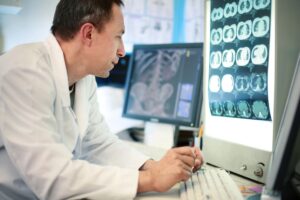
To organize treatment abroad, do the following:
- Consult with your attending physician to assess the need and possibility of treatment abroad.
- The doctor prepares medical documents and submits an application for medical evacuation to the Ministry of Health of Ukraine or through other official channels.
- After confirmation, the clinic and country are selected and logistics (transportation, accommodation, translation of documents) are organized.
- Charitable foundations can participate by helping financially or by coordinating the process.
Advantages:
- Access to modern treatments that are not yet being implemented in Ukraine.
- Opportunity to participate in international clinical trials.
- Experience of doctors specializing in rare forms of cancer.
There may be difficulties:
- Language barrier (you may need an interpreter).
- Long separation from the family.
- Psychological adaptation to a new country.
- Organizational difficulties (visas, transportation, living arrangements).
- Additional expenses for housing and living in another country.
These methods can be used individually or in combination, depending on the type and stage of cancer, as well as the child's general condition.
Our partners
